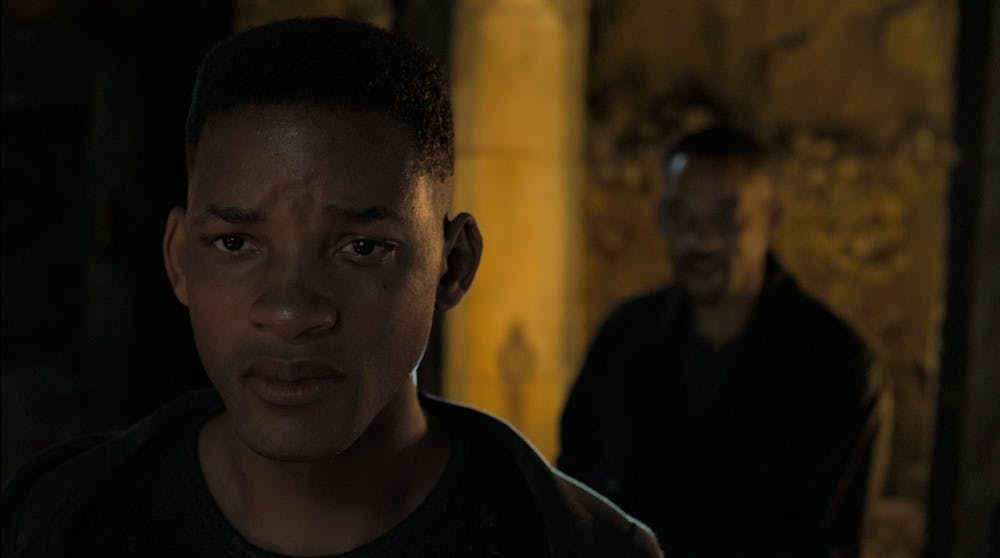Ang Lee is a peculiar director. While he perhaps garnered the most acclaim for his 2000 classic Crouching Tiger, Hidden Dragon, he is equally renowned for the touching Brokeback Mountain. In many cases, Lee's films jolt back and forth between fast–paced action to tender drama, like in the critically adored Life of Pi. Lee’s most recent film, Gemini Man, leans in the action direction, but stops short of fully becoming a sci–fi flick, a comedic drama, or even a guns–blazing, nonsensical action, making it feel muddled and half–finished.
Anybody who knew anything about Gemini Man before walking into a theater knew two things: it stars Will Smith, and Will Smith has a clone. Smith acts as he always does in the part of Henry Brogan, with gruff yet comedic charm, bouncing off his fellow actors—mostly just Mary Elizabeth Winstead—admirably. The film, though, acts as if its audience isn't already aware of the fact that Will Smith has a clone—as if they didn't put that detail in every trailer leading up to the film's release. The characters spend the first fifteen minutes after seeing a de–aged Henry—sent as an assassin after the real Henry—deliberating over why, exactly, that guy looks so much like the real Henry. Dani (Winstead) questions him a few times about any romances, believing the kid to be Henry's son, until she secretly does a blood test to discover, to the surprise of everyone, that he’s actually Henry’s clone.
This reveal would have made more of an impact if it were scientifically explained, but no one really bats an eye at how precisely Henry's clone came to be. In vague terms, it is explained that Clay Varris (Clive Owen), a generic suspicious higher–up, secretly took Henry’s blood and used it to make an identical copy of Henry from birth, raising the clone as his own son. How precisely this blood held the genetic material to not only create another human being, but to make an identical copy, is questionable, but it seems that the writers were too afraid to delve into sci–fi territory and left it at that.
The resistance to lean into the sci–fi genre, which Gemini Man most neatly fits into, makes the movie read like a Star Trek plot, but worse—at least Star Trek knew what it was going for. Instead of analyzing culture by seeing what happens when science advances too far, the movie harps on and on about the importance of relationships, staying human, and not becoming a highly elite assassin for the government. See, Henry is basically James Bond—even the movie's opening scene on a train echoes Skyfall—but if government he worked for was bad. There must be some critique in here—Henry is getting chased down by his ex–bosses for learning that he killed an innocent man. Brogan and his associates are constantly having their conversations eavesdropped on by technology. Certainly this is a deep–layered critique of the American government; and yet, the Russians are still one–note bad guys, one of the men responsible for the attempted murder of Henry isn’t actually that evil, and Dani even ends up staying with the pseudo–CIA that was trying to kill her for a week because she just loves her country so damn much.
Other odd tidbits about Gemini Man are the young Will Smith, who is basically just Will Smith without his smile lines and a different haircut. These minor difference doesn't make the two of them all that easy to differentiate. Though the effects are pretty good, his mouth doesn’t quite match up to the dialogue, which is endlessly irritating. Otherwise, characters in the film conveniently appear and disappear again with little care for how that works thematically. The pacing feels jagged and the plot unsure of itself.

Gemini Man has been in development hell since 1997, with names like Mel Gibson, Harrison Ford, and even Sean Connery getting attached and unattached to the script. Even with the film firmly under Lee’s command, its release has seen media buzz about the film allegedly not getting “played correctly”: Lee insisted that it had to be played at a whopping 4K resolution, 120 FPS, in 3D. If Christopher Nolan’s suggestion that his films were only meant to be played in theaters was a high task, Lee’s request goes above and beyond.
Still, Gemini Man is just not a very good film. Its writing is sloppy and often falls into bad action–movie tropes—including a woman stripping as an irrelevant plot device—and its tone is all over the place, like Lee himself was unsure whether you should be laughing or not. Despite this film being in development for 20 years, everyone seemed to forget that the first goal should not just be to get the film released: It should actually be good, too.







